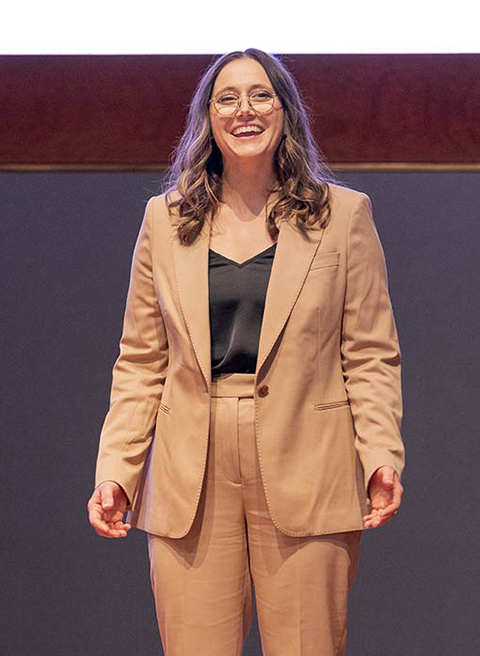Postdoc Tarryn Miller Crafts 3-Minute Talk for First National Lab Research SLAM
Tells Judges About Changing Plant Lignin Into Legos
National Renewable Energy Laboratory (NREL) Director's Fellowship postdoctoral researcher Tarryn Miller competed in the first National Lab Research SLAM competition on Nov. 15, 2023, in Washington, D.C.
“I was incredibly nervous,” she laughed. “But it was a super-positive experience.”

Miller had memorized and rehearsed her required three-minute talk on the conversion of biowaste into new products. She was in Washington with 16 other contestants representing all the other national laboratories. In preparation, the group spent time together reviewing one another’s talks beforehand and had received coaching from a science communicator.
They also met with elected officials from the U.S. House of Representatives National Labs Caucus and the Senate National Labs Caucus. Overall, the time was “very collaborative and supportive,” Miller said.
Still, she was standing alone on stage when she addressed judges along with an audience of more than 200 people in the Congressional Auditorium of the Capitol Building: no props or animation—only a single PowerPoint slide—and a ticking clock.
The 180-second time limit, she knew, was strictly enforced, which added to the pressure.
Her talk was part of the Environmental Resilience group, one of four categories in the contest. The science she presented was about outer membrane vesicles (OMVs), which she described as microscopic bubbles secreted by microbes. OMVs, Miller said, offer a possible solution to biological upcycling of waste by playing a pivotal role in biological processes, such as waste removal and communication.
However, because the SLAM is designed to highlight the Department of Energy’s research programs—as well as to help educate policymakers and their staff about the key role that the national laboratories play in the nation’s innovation—presentation concepts needed to be delivered in language that a general audience could grasp.
In Miller’s talk, she drew upon her own love of crafts to make a comparison between craftspeople, who recycle items such as wood into furniture, and her own research into OMVs, with the possibility of recycling waste into useful goods.
As she told the audience, “I want to harness these little bubbles to solve big problems,” explaining, “I will reprogram them to aid in the conversion of lignin into today’s plastics, flavors, or fuel.” And she did deliver her punchline, saying that she is “basically changing lignin into Legos!” The line was well received, even if she did not end up winning.
Miller, a Colorado School of Mines graduate who arrived at NREL in February, is mentored by Gregg Beckham and Alli Werner in the Bioenergy Science and Technology directorate. Both Beckham and Werner helped her to write her successful Director’s Fellowship proposal.
The Fruita, Colorado, native, who always dreamed of becoming a scientist, found her passion in biological research as a Mines senior. Miller then spent six years earning her Ph.D. from Germany’s Max Planck Institute for Terrestrial Microbiology. There, her research focused on powering synthetic carbon fixation with light.
It was at Mines that she first met Jahi Simbai, now in NREL’s Human Resources department. Simbai encouraged her to apply for the SLAM, so she recorded a three-minute video and sent it to the competition’s judges. “She has been a tremendous representative of NREL” he said. He noted that Miller was “able to distill some very complex topics from her Director’s Fellowship research down so folks like me can understand it.”
Miller said she expects to be at NREL as a fellow for at least three years. And she looks forward to encouraging others here to apply for next year’s SLAM. However, she does not plan to compete again.
Regardless, she is a supporter of the event, which challenges scientists to share their research succinctly with a general audience—while trying to ignore the ticking of a timer.

